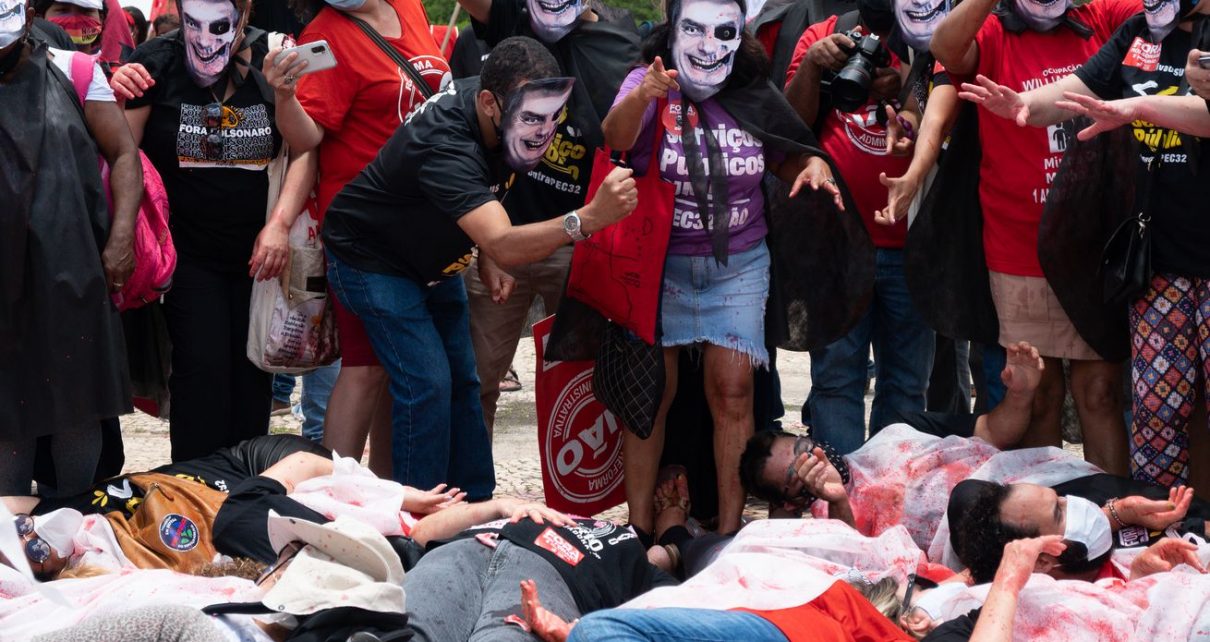
Brazilian lawmakers may try to make the case, though experts are skeptical of how far it could go.
Brazil has the world’s second-highest official Covid-19 death toll, just after the United States, with more than 600,000 fatalities. Manaus, the capital of the Amazonas, had a deadly first wave that saw mass graves, and a dangerous second where it ran out of oxygen. Through it all, Brazilian President Jair Bolsonaro downplayed what he once called the “little flu,” dismissed public health measures, and promoted unproven treatments like hydroxychloroquine while undermining proven approaches, like vaccines.
Now some Brazilian lawmakers are trying to hold Bolsonaro and his associates accountable. A Senate committee will vote Tuesday on a more than 1,000-page report outlining the government’s mishandling of the Covid-19 outbreak and vaccination campaign. The result of a months-long inquiry by a congressional panel, the report recommends charges for Bolsonaro, among them falsification of documents, misuse of public funds, and charlatanism.
And one particular allegation stands out: “crimes against humanity.”
The report says crimes against humanity come into play as “the entire population was deliberately subject to the effects of the pandemic, with the intention of trying to reach herd immunity through contagion and save the economy.” The report specifically ties these “crimes against humanity” to Indigenous peoples, saying the virus was an “ally” of the Bolsonaro government in its anti-Indigenous policies.
The committee had initially recommended Bolsonaro also face charges of genocide and mass homicide for the Covid-19 toll on the Indigenous population, but those recommendations were removed from the final version after several senators said those allegations went too far, according to the New York Times.
The “crimes against humanity” charge raises a question beyond Bolsonaro, and Brazil, about how to hold leaders accountable for real malfeasance and negligence during public health emergencies, like the still-unfolding Covid-19 pandemic. And does malfeasance rise to the level of egregiousness the world typically associates with war and repression — or at least could it?
The question is largely untested, specifically at the International Criminal Court, the venue to which the Senate committee may refer the “crimes against humanity” charge, if senators agree to it in the final vote. (Lawmakers are likely to refer the other allegations to the prosecutor-general, but he is a Bolsonaro ally and is unlikely to pursue criminal charges against the president or any of his associates.) The ICC, based in the Hague, is sometimes called the “court of last resort,” stepping in when nations themselves cannot or will not prosecute war crimes, genocide, and crimes against humanity.
It seems unlikely that Bolsonaro’s Covid-19 gross mismanagement will be taken up by the court, many experts said — but deliberate mishandling of a disease could still fit within the definition of “crimes against humanity.”
If this case is referred to the ICC, it may be the first test of whether leaders can face criminal consequences for public health disasters of their own making.
Should leaders be held accountable for Covid-19 malfeasance?
The ICC could take up a case against Bolsonaro in theory. Brazil is party to the Rome Statute, the treaty that brought the court into force in 2002. That means if crimes against humanity happen in Brazil, the ICC has jurisdiction, said David Bosco, an associate professor of international studies at Indiana University who’s researched the ICC. (Not all countries are signatories, including the United States, which feared American troops might be subject to prosecution for actions overseas; the Trump administration even sanctioned some top ICC officials.)
But even if the Senate does follow through, a referral to the ICC prosecutor is just that. It’s ultimately up to the ICC to take up a case, examine it, and pursue it. Typically, cases are referred by states themselves (or the United Nations Security Council), but it seems unlikely that the Bolsonaro government is going to refer itself. The ICC doesn’t have an obligation to pursue any referral from an outside group or even lawmakers, though the ICC can initiate its own investigations. The ICC has 15 investigations underway, and 12 preliminary investigations, according to the ICC’s website, none of them in Brazil right now.
As troubling as the allegations against Bolsonaro are in this big report, they are not a neat fit for a crimes against humanity case.
It’s worth starting with what the law says. The Rome Statute says a crime against humanity exists “when committed as part of a widespread or systematic attack directed against any civilian population, with knowledge of the attack.” That could be widespread or systematic murder, or forced disappearance, or, as the very last provision says: “other inhumane acts of a similar character intentionally causing great suffering, or serious injury to body or to mental or physical health.”
David Scheffer, a senior fellow at the Council on Foreign Relations and former US ambassador-at-large for war crimes issues who helped lead the US delegation on ICC talks two decades ago, said the catchall nature of the last one is deliberate. “It is obvious that other types of assaults on your civilian population are going to emerge in the future, and you have to provide for that in the statute,” he said. “It’s hard to think of a better example than intentional mismanagement of a Covid-19 pandemic or some other pathogen. And so I would argue that, yes, that’s fair game.”
The investigations and prosecutions that the ICC takes up involve some of the most brutal crimes, and so the bar is incredibly high: To prove crimes against humanity, of any sort, prosecutors have to prove knowledge and intent.
“Disease can be a weapon, and so you could certainly imagine that constituting a crime against humanity,” Bosco said. “But negligence or disinformation, that would be a harder fit.”
It’s especially tricky with a still-evolving event like the Covid-19 pandemic. The science changed, and is changing. The origins of the disease, different possible treatments, the mask-wearing of it all — expert opinion shifted throughout the pandemic. A robust pandemic response also takes resources that leaders might not have, and not all countries have access to lifesaving medical interventions like vaccines.
As experts pointed out, it is a very high bar to prove knowledge and intent, and that’s ultimately what the ICC prosecutors would have to investigate and prove in any case involving crimes against humanity. Trying to parse that out in an evolving pandemic and with a new pathogen is an extraordinary task. But, as Scheffer said, as the scientific consensus coalesces, public officials “need to be responsible enough to follow the procedures and policies that can defeat and overcome the public health threat to their populations.”
Experts I spoke to say there really isn’t an obvious precedent for a crime against humanity case in a public health setting; the closest examples, like destruction of water systems in Darfur, Sudan, came in the context of a larger conflict. Covid-19 has killed nearly 5 million people globally, and failures in leadership around the world likely exacerbated the toll. Other leaders have made missteps, or denied the seriousness of the pandemic at points, that may have contributed to Covid-19’s spread, from India’s Narendra Modi to the United Kingdom’s Boris Johnson to Donald Trump in the US.
But deliberate intent to allow a disease to spread has to be carefully and precisely separated from what was done in error, or ineptly. The ICC is dealing with some very tough and longstanding investigations, which makes it seem unlikely it would take up a case like this. “Bolsonaro’s response to Covid has been egregious, but for both legal and pragmatic reasons, I don’t see it being something that the ICC will take up,” said Rebecca Hamilton, an associate professor at Washington College of Law.
Bolsonaro is already facing referrals to the ICC, mostly from Indigenous and environmental groups. A few weeks ago, a group accused Bolsonaro of “crimes against humanity” for the “widespread attack on the Amazon, its dependents and its defenders that not only result in the persecution, murder and inhumane suffering in the region, but also upon the global population.”
Another ICC referral could certainly raise the profile of those other cases, and, especially since the Senate’s report focuses a lot on the Covid-19 fallout on Indigenous communities, Scheffer said the cases all might look a lot stronger together. “The ICC has a thick file on Brazil right now, a very thick file,” he said.
And it is still remarkable that lawmakers in Brazil are making the case not only that Bolsonaro failed at the pandemic, but also that some of his actions constitute a crime against humanity. It’s an attempt to hold Bolsonaro himself accountable and potentially to secure guardrails for the next pandemic or public health crisis. If leaders faced the threat of criminal prosecution for putting their populations at grave risk, they might not pursue those policies at all.





